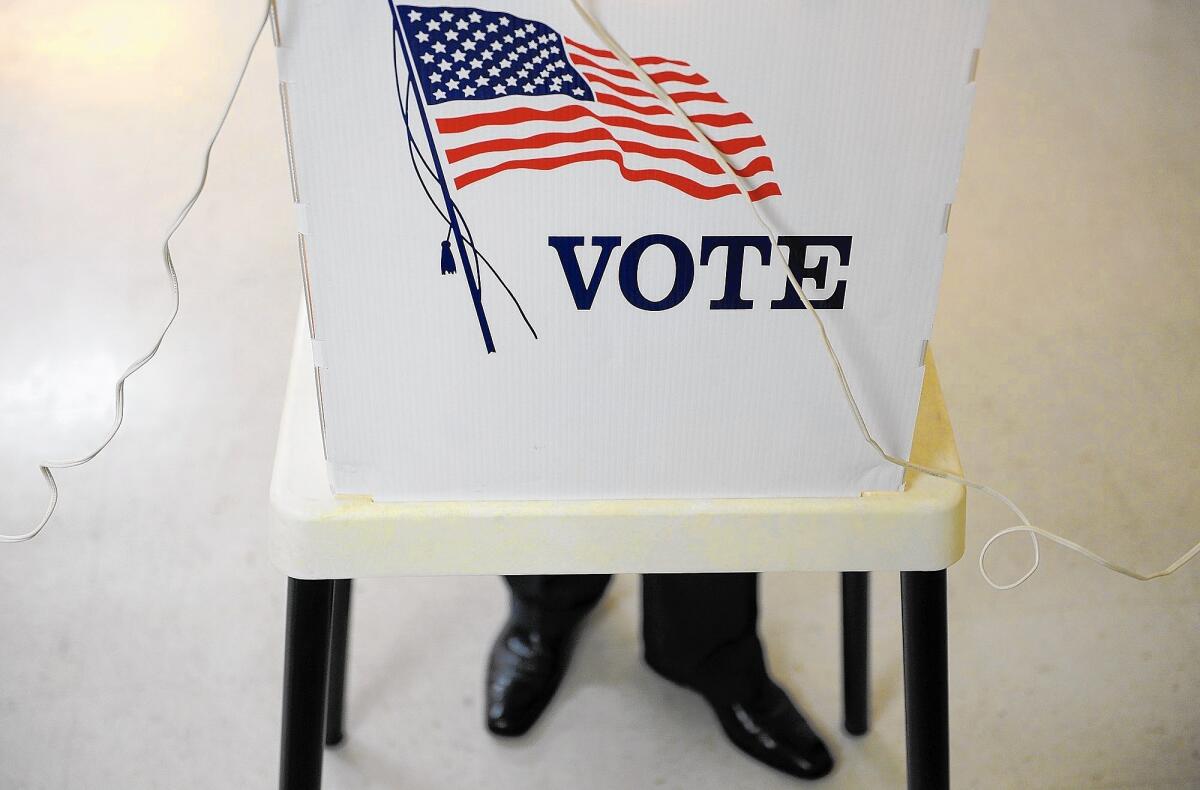Prop. 46 foes spent $60 million to maintain 1975 malpractice award cap

- Share via
Reporting from SACRAMENTO — The election day drubbing of Proposition 46, an initiative that would have increased limits on certain medical malpractice damages, marks a stinging defeat for the state’s trial attorneys, who championed the measure.
The defeat caps years of declining influence for one of the Democratic Party’s most stalwart allies. Even in deep blue California, attorneys have been unable to push through legislative changes in the decades-old malpractice award cap of $250,000.
“We had been punched around on this issue for so many years in Sacramento that we had to do something,” said Brian Kabateck, past president of the Consumer Attorneys of California. Not acting to have the limit raised, he said, “would have looked weak.”
But facing nearly $60 million amassed by opponents, the ballot measure was rejected by more than two-thirds of voters — failing in every California county. The rejection left lawyers on their heels and the prospect of future increases in pain and suffering awards in medical negligence cases murky.
Lawyers say the limit on those awards makes it economically impossible to take on many malpractice lawsuits.
The dispute dates to 1975, when the cap was first imposed. Battle lines were initially drawn along largely partisan lines: Lawyers aligned with Democrats, while supporters of the cap — including the California Medical Assn. and malpractice insurance companies — typically sided with Republicans.
But as Democrats consolidated their power in the Legislature over the years, the cap’s supporters expanded their reach. The California Medical Assn. brought on Steve Thompson, a top staffer for longtime Democratic Assembly Speaker Willie Brown, as its chief lobbyist in the early 1990s. Successive lobbyists have also come from Democratic ranks, such as women’s-rights groups and labor unions.
The medical organization has spent nearly $22 million on lobbying since 1999, when online lobbying filings started. They’re joined on the issue by a deep-pocketed coalition of malpractice insurers, hospitals and dentists.
The attorneys group has spent almost $18 million on lobbying since 1999.
“Money talks,” said Kabateck, addressing the lawyers’ waning influence in the Capitol.
Dustin Corcoran, chief executive of the California Medical Assn., dismissed the claim that money makes his group more powerful, saying it has its own battles against well-funded opponents.
“I would never let our association use that as an excuse when we’re going up against Big Tobacco or insurers,” he said.
With no success in the Capitol, attorneys, along with malpractice victims and the advocacy group Consumer Watchdog, decided last year to propose a ballot measure, hoping the threat of a costly initiative fight would induce a last-minute legislative deal.
In addition to raising the cap to $1.1 million, the proposal would have also required doctors to consult a statewide database before prescribing narcotic medications and mandate that hospitals randomly test their physicians for substance abuse.
The latter was popular with early focus groups, and proponents believed drug testing would aid the measure’s passage at the polls.
But doctors and their allies said they would not negotiate on the terms of a bill under threat of an initiative. Corcoran accused the lawyers of “blatantly trying to extort a change in the law they couldn’t get otherwise.”
In the ensuing initiative fight, the ‘no’ side had an immense money advantage, collecting more than $30 million before the measure qualified for the ballot. Its war chest eventually grew to almost $60 million.
The “no” campaign hit the airwaves in August; by election day, the state had been saturated with anti-Proposition 46 ads.
Proponents of the measure, meanwhile, collected most of their $12.5 million relatively late in the game, hobbling their advertising ability.
“They were on ‘Monday Night Football.’ ... We were on a couple of daytime soap operas a month later,” said Geoff Wells, president of the Consumer Attorneys Assn. of Los Angeles.
The measure’s multiple components made it vulnerable to numerous lines of attack.
The American Civil Liberties Union opposed the drug-testing provision. Planned Parenthood fought an increase in the award cap, arguing it would drive up malpractice insurance premiums for practitioners.
“Proposition 46 suffered from the fact that its authors made it a Christmas tree,” said Eric Bauman, chairman of the Los Angeles County Democratic Party.
Even after the measure’s overwhelming defeat, lawyers say they’ll continue to press the issue. But their opponents say voters have given them the upper hand.
“Undermining California’s long-standing malpractice cap,” Corcoran said on election night, “is a political poison pill and a policy third rail.”
Twitter: @melmason
More to Read
Sign up for Essential California
The most important California stories and recommendations in your inbox every morning.
You may occasionally receive promotional content from the Los Angeles Times.













